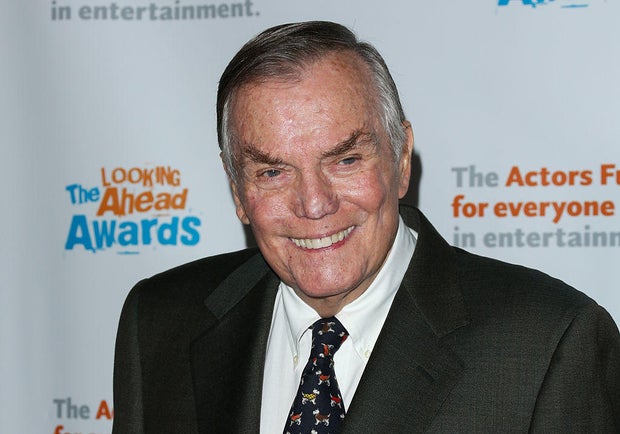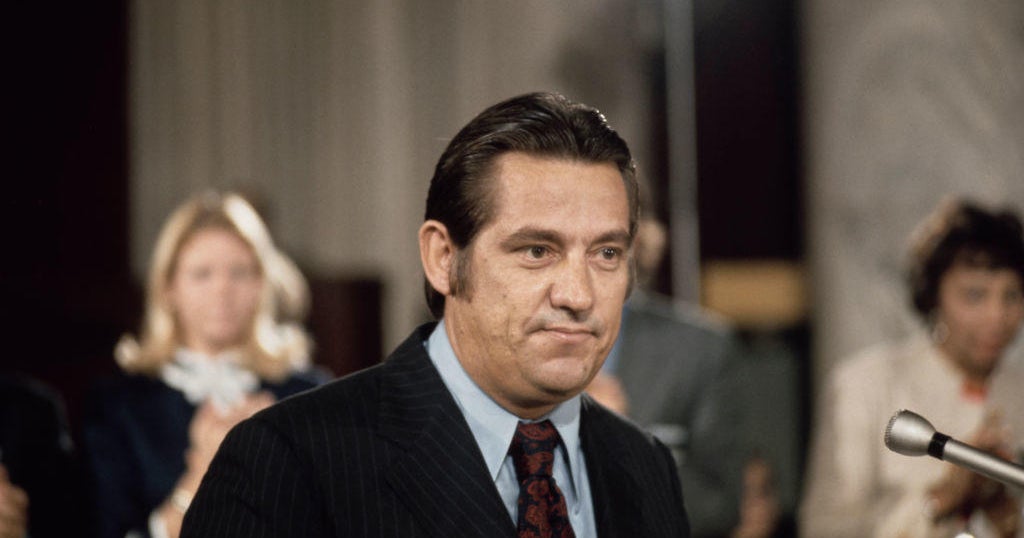CBS News
Peter Marshall, longtime “Hollywood Squares” host, dies at 98

Peter Marshall, the actor and singer turned game show host who played straight man to the stars for 16 years on “The Hollywood Squares,” has died. He was 98.
Marshall died of kidney failure Thursday morning at his home in Los Angeles, his family announced in a statement provided to CBS News through his publicist.
Marshall helped define the form of the smooth, professional, but never-too-serious modern game show host on more than 5,000 episodes of the series that ran on NBC from 1966 to 1981.
But he was often closer to a talk show host, and the tic-tac-toe game the contestants played, while real, was all an excuse for a good time. The questions Marshall posed to regulars like Paul Lynde, George Gobel and Joan Rivers were designed to be set-ups for joke answers before the real ones followed.
“It was the easiest thing I’ve ever done in show business,” Marshall said in a 2010 interview for the Archive of American Television. “I walked in, said ‘Hello stars,’ I read questions and laughed. And it paid very well.”
Paul Archuleta / Getty Images
“The Hollywood Squares” would become an American cultural institution and make Marshall a household name. It would win four Daytime Emmys for outstanding game show during his run and spawned dozens of international versions and several U.S. reboots. Not only was it a forum for such character actors as Charlie Weaver (the stage name of Cliff Arquette) and Wally Cox, but the show attracted a range of top stars as occasional guests, including Aretha Franklin, Mel Brooks, Carl Reiner, Ed Asner and Janet Leigh.
Marshall had a warm rapport with Weaver, Lynde and others, but said that Gobel, the wry comedian, actor and variety show host, held a special place, tweeting in 2021 that it’s “no secret he was my closest friend on Hollywood Squares and my absolute all-time favorite Square!”
Marshall had lived nearly an entire show business life before he took the “Squares” podium at age 40.
He had toured with big bands starting as a teenager, had been a part of two comedy teams that appeared in nightclubs and on television, appeared in movies as a contract player for Twentieth Century Fox, and had sung in several Broadway musicals when the opportunity came up after Bert Parks, who hosted the pilot, bowed out.
“I am a singer first I am not a game show host,” Marshall told his hometown paper, the Herald-Dispatch of Huntington, West Virginia in 2013, “that was just a freak opportunity. I had been on Broadway with Julie Harris and was going back to Broadway when I did the audition, and I thought it was a few weeks but that turned into 16 years.”
“The Hollywood Squares” was more strait-laced when it began, but early in its run a producer suggested they write jokes for Lynde, the ever-snarky comic actor who occupied the center square and would become as identified as Marshall with the show.
Born Ralph Pierre LaCock in Clarksburg, West Virginia, Marshall would move around the state as a child, living in Wheeling and Huntington.
His father died when Marshall was 10, and he would live with his grandparents as his mother and sister, the actress Joanne Dru, moved to New York to pursue her career in show business. Marshall would soon join them.
At 15, he toured as a singer with the Bob Chester Orchestra. He also worked as an NBC Radio page and an usher at the Paramount Theater. He was drafted during World War II and stationed in Italy, where he made his first forays onto the airways as a DJ for Armed Forces Radio. In 1949 he formed a comedy duo with Tommy Noonan, appearing in nightclubs, in theaters and on “The Ed Sullivan Show.”
He became a movie contract player in the 1950s at Twentieth Century Fox, appearing in films including 1959’s “The Rookie” and 1961’s “Swingin’ Along.”
Major starring roles eluded him in Hollywood, but he would find them in musical theater.
He starred opposite Chita Rivera in “Bye Bye Birdie” in London’s West End in 1962 — Lynde had played a major role in the Broadway version that he would reprise in the film — and played his first starring role on Broadway in “Skyscraper” with Julie Harris in 1965.
He would also appear in Broadway versions of “High Button Shoes,” “The Music Man” and “42nd Street.”
After “The Hollywood Squares,” Marshall would host a few other short-lived game shows, but mostly resumed his career as a singing actor, starring in more than 800 performances of “La Cage Aux Folles” on Broadway and on tour, and singing in the 1983 film version of “Annie.”
He was married three times, the last to Laurie Stewart in 1989.
The couple survived a bout with COVID-19 early in 2021. He was hospitalized for several weeks.
His four kids include son Pete LaCock, a professional baseball player for the Chicago Cubs and Kansas City Royals. Marshall is also survived by his wife Laurie, daughters Suzanne and Jaime, son David, 12 grandchildren, and nine great-great grandchildren.
CBS News
Trump makes more Cabinet picks but some top economic posts remain unfilled

Watch CBS News
Be the first to know
Get browser notifications for breaking news, live events, and exclusive reporting.
CBS News
Open: This is “Face the Nation with Margaret Brennan,” Nov. 24, 2024

Watch CBS News
Be the first to know
Get browser notifications for breaking news, live events, and exclusive reporting.
CBS News
Popular gluten free tortilla strips recalled over possible contamination with wheat

A food company known for popular grocery store condiments has recalled a package of tortilla strips that may be contaminated with wheat, the U.S. Food and Drug Administration said Friday. The product is meant to be gluten-free.
Sugar Foods, a manufacturing and distribution corporation focused mainly on various toppings, artificial sweeteners and snacks, issued the recall for the “Santa Fe Style” version of tortilla strips sold by the brand Fresh Gourmet.
“People who have a wheat allergy or severe sensitivity to wheat run the risk of serious or life-threatening allergic reaction if they consume the product,” said Sugar Foods in an announcement posted by the FDA.
Packages of these tortilla strips with an expiration date as late as June 20, 2025, could contain undeclared wheat, meaning the allergen is not listed as an ingredient on the label. The Fresh Gourmet product is marketed as gluten-free.
Sugar Foods said a customer informed the company on Nov. 19 that packages of the tortilla strips actually contained crispy onions, another Fresh Gourmet product normally sold in a similar container. The brand’s crispy onion product does contain wheat, and that allergen is noted on the label.
U.S. Food and Drug Administration
No illnesses tied to the packaging mistake have been reported, according to the announcement from Sugar Foods. However, the company is still recalling the tortilla strips as a precaution. The contamination issue may have affected products distributed between Sept. 30 and Nov. 11 in 22 states: Arizona, California, Colorado, Florida, Georgia, Iowa, Idaho, Illinois, Indiana, Maryland, Maine, Michigan, Minnesota, North Carolina, New Jersey, Ohio, Oregon, Pennsylvania, Texas, Utah, Virginia and Washington.
Sugar Foods has advised anyone with questions about the recall to contact the company’s consumer care department by email or phone.
CBS News reached out to Sugar Foods for more information but did not receive an immediate reply.
This is the latest in a series of food product recalls affected because of contamination issues, although the others involved harmful bacteria. Some recent, high-profile incidents include an E. coli outbreak from organic carrots that killed at least one person in California, and a listeria outbreak that left an infant dead in California and nine people hospitalized across four different states, according to the Center for Disease Control and Prevention. The E. coli outbreak is linked to multiple different food brands while the listeria outbreak stemmed from a line of ready-to-eat meat and poultry products sold by Yu-Shang Foods.









